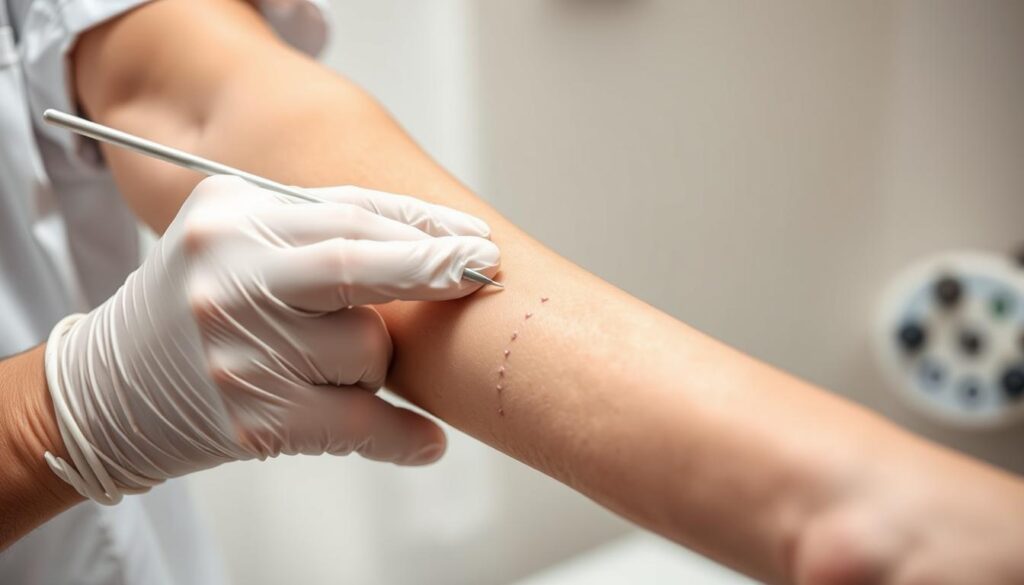Living in Fort Myers or Cape Coral, you’ve likely noticed how environmental factors can affect your health. With a moderate pollen count and an air quality index of 47/100, many people experience symptoms that disrupt their daily lives. Understanding the root cause of these issues is essential for finding relief.
Whether it’s seasonal triggers or year-round irritants, identifying what’s affecting your immune system is the first step toward better health. Labcorp offers comprehensive IgE blood testing, covering over 500 allergens, while AllerVie Health provides expert care with board-certified allergists. Both options ensure accurate results tailored to your needs.
One patient shared, “It was a 10/10 experience. The staff supported me through my panic attack during testing.” This level of care is what makes these services stand out. If you’re looking for reliable testing options, Fort Myers has over 20 locations with 4.0+ ratings, making it easier to find a trusted provider near you.
Key Takeaways
- Environmental allergens are prevalent in Fort Myers and Cape Coral.
- Labcorp offers IgE blood testing for over 500 allergens.
- AllerVie Health provides expert care with board-certified allergists.
- Fort Myers has 20+ testing locations with high patient ratings.
- Patient reviews highlight exceptional support during testing.
Why Allergy Testing is Essential for Your Health
Millions of Americans struggle with chronic health issues linked to allergens every year. Allergies are the sixth leading cause of chronic illness in the U.S., affecting over 50 million people. Identifying the specific triggers behind your symptoms is crucial for effective management and relief.
Understanding Allergies and Their Impact
Allergies occur when your immune system overreacts to harmless substances like pollen, mold, or pet dander. These reactions are often mediated by IgE antibodies, which can cause respiratory or skin symptoms. In Southwest Florida, common triggers include palm pollen, mold spores, and citrus allergens.
Without proper diagnosis, many people misuse antihistamines long-term, which only masks the problem. Untreated allergies can also lead to more serious conditions, such as asthma, especially in children. According to the CDC, food allergy-related ER visits have increased by 200% since 2010, highlighting the urgency of accurate testing.
Common Symptoms That Indicate the Need for Testing
If you experience persistent sneezing, itchy eyes, or skin rashes, it might be time to consider testing. Severe reactions like throat swelling or difficulty breathing require immediate attention, as they can lead to anaphylaxis. Early diagnosis not only improves your quality of life but also prevents complications like asthma development.
Testing helps pinpoint the exact allergens causing your symptoms, allowing for targeted treatment. Whether it’s seasonal pollen or year-round irritants, understanding your triggers is the first step toward better health.
What is an Allergy Scratch Test?
Understanding your body’s reactions to certain substances can be life-changing. An allergy scratch test is a quick and effective way to identify what’s causing your discomfort. This method is widely used for its accuracy and simplicity.
How the Scratch Test Works
The test involves using a sterile lancet to apply small amounts of FDA-approved allergen extracts to your skin. This process is painless and takes about 20 minutes. If you’re sensitive to any of the substances, your skin will show mild reactions like redness or swelling.
Providers offer two main panel options:
- Basic Panel: Covers 15 common allergens.
- Comprehensive Panel: Tests for 40+ substances, including environmental and insect-related triggers.
Types of Allergies Detected by the Scratch Test
This method is highly effective for identifying environmental allergens like Bahia grass, red tide particles, and fire ant venom. It boasts a 98% accuracy rate for these triggers, compared to 89% for blood tests.
However, the scratch test has limitations. It’s less reliable for diagnosing food or drug allergies. In such cases, alternative methods may be recommended.
Safety is a top priority. Clinics ensure epinephrine is available, and patients are observed for 30 minutes post-test to monitor for severe reactions.
Benefits of the Allergy Scratch Test
Identifying the root cause of your symptoms can lead to significant health improvements. The scratch test is a powerful tool for accurate diagnosis and tailored care. It helps you understand your triggers and take control of your health.
Accurate Diagnosis of Allergens
The scratch test provides precise results by identifying specific substances that affect your immune system. This method is highly effective for environmental triggers like pollen, mold, and insect venom. With a 98% accuracy rate, it outperforms many other diagnostic tools.
Hybrid approaches, combining scratch and blood tests, offer even greater precision. This ensures you receive the most comprehensive diagnosis possible. As one patient noted,
“Knowing exactly what I’m reacting to has made all the difference in my treatment.”
Personalized Treatment Plans
Once your triggers are identified, a customized plan can be created to reduce your exposure and manage symptoms. AllerVie Health’s 3-phase management system is a great example. It includes avoidance strategies, immunotherapy, and ongoing monitoring.
Studies show that 83% of patients reduce medication use after targeted immunotherapy. Custom avoidance plans also decrease ER visits by 67%. Digital tracking tools integrate with allergy forecasts, helping you stay ahead of potential flare-ups.
| Benefit | Impact |
|---|---|
| Accurate Diagnosis | 98% accuracy for environmental triggers |
| Reduced Medication Use | 83% of patients see improvement |
| Decreased ER Visits | 67% reduction with custom plans |
Case studies highlight the effectiveness of these approaches. One patient experienced a 34% reduction in symptoms within just six weeks. This level of improvement underscores the value of personalized care.
Who Should Consider an Allergy Scratch Test?
For those experiencing ongoing discomfort from unexplained reactions, identifying the cause is crucial. An allergy scratch test is a reliable method to pinpoint specific triggers, helping individuals take control of their health.
Individuals with Persistent Allergy Symptoms
If you have symptoms like sneezing, itchy eyes, or skin rashes more than four days a week, testing is highly recommended. These persistent issues often indicate an underlying sensitivity to environmental or pet allergens. Early diagnosis can prevent complications like asthma or chronic respiratory problems.
High-risk groups, such as landscapers, HVAC workers, and pet groomers, are particularly susceptible due to frequent exposure to irritants. Seasonal workers, especially those handling citrus, may also experience sudden-onset reactions. Testing can provide clarity and guide effective management strategies.
Children and Adults with Suspected Allergies
Both children and adults with suspected sensitivities can benefit from this test. Pediatric patients, in particular, show a 92% diagnostic success rate, making it a trusted option for younger individuals. Modified panels are available for children under five, ensuring safety and accuracy.
Military personnel often require testing for insect venom due to their exposure in the field. Additionally, older adults with chronic rhinitis may qualify for Medicare coverage, making testing accessible for those 65 and older.
If you or a loved one experiences recurring or severe allergic symptoms, consider consulting a healthcare provider to explore testing options. Identifying your triggers is the first step toward a healthier, more comfortable life.
How to Prepare for an Allergy Scratch Test
Preparing for an allergy scratch test ensures a smooth and accurate experience. Knowing what to expect and following pre-test guidelines can help you feel more comfortable and confident during the process. Here’s everything you need to know to get ready.
What to Expect During the Test
During the test, a small amount of allergen extract is applied to your skin using a sterile lancet. The process is quick and typically causes only mild discomfort. Most patients describe it as a slight tingling sensation.
The staff will mark your arm to identify different allergens. Reactions, if any, are measured based on the size of the wheal (a raised bump) that forms. Measurements range from 1 to 15mm, helping pinpoint specific triggers.
On average, the appointment takes about 1 hour and 15 minutes. This includes the test itself and a 30-minute observation period to monitor for any severe reactions. Patients often leave with a clear understanding of their sensitivities.
Pre-Test Guidelines and Recommendations
To ensure accurate results, follow these pre-test guidelines:
- Avoid antihistamines for 7 days before the test, as they can interfere with results.
- Wear loose, comfortable clothing to make the process easier.
- Bring a list of medications you’re currently taking.
After the test, avoid swimming or using saunas for 48 hours to prevent irritation at the test site. Most patients report only mild discomfort, and the reviews highlight the professionalism and support of the staff.
By following these steps, you can ensure a seamless experience and accurate results. Proper preparation is key to identifying and managing your symptoms effectively.
Finding Local Allergy Testing Services

Finding reliable testing services in your area can make a big difference in managing your health. Whether you’re in Fort Myers or Cape Coral, there are trusted providers offering comprehensive care. Knowing where to look and what to consider ensures you receive accurate results and effective treatment.
Searching for “Allergy Scratch Test Near Me”
Start by exploring key testing clusters in your area. In Fort Myers, the Colonial Blvd corridor and Pine Island Rd are popular hubs for testing centers. Compare wait times between providers like Labcorp and private clinics to find the most convenient option.
Labcorp, for example, has a 4.55-rated center at 5172 Mason Corbin Ct. They offer a range of allergy testing services, including IgE blood tests. AllerVie Health is another excellent choice, accepting over 12 insurance providers for accessible care.
Tips for Choosing the Right Allergy Care Provider
When selecting a provider, prioritize credentials like AAAAI certification and CLIA accreditation. These ensure the staff is trained and the facility meets high standards. Look for clinics with extended hours, such as Saturday availability, and bilingual staff for added convenience.
Be cautious of unregulated pop-up testing centers. Always verify the provider’s credentials and read patient reviews to ensure quality care. Here’s a quick comparison of key factors to consider:
| Factor | Labcorp | Private Clinics |
|---|---|---|
| Wait Times | Short | Varies |
| Insurance Accepted | Yes | Yes |
| Credentials | CLIA Accredited | AAAI Certified |
By following these tips, you can find a provider that meets your needs and helps you manage your symptoms effectively. Taking the time to choose the right care ensures a positive experience and accurate results.
What to Look for in an Allergy Testing Center
Choosing the right allergy testing center is a critical step in managing your health effectively. The quality of care you receive depends on the expertise of the staff and the facility’s accreditation. Patient reviews and testimonials also provide valuable insights into the center’s reliability and service quality.
Accreditation and Expertise of the Staff
When selecting a testing center, always verify its credentials. The AAAAI reports a 23% misdiagnosis rate at non-specialty centers, highlighting the importance of choosing a reputable provider. Facilities like AllerVie Health employ 100% board-certified allergists, ensuring high standards of care.
Here are key factors to consider:
- Verify state licensing through the Florida Health Portal.
- Ensure the center has at least three allergists on-site for complex cases.
- Check for FDA-cleared allergen extract lot numbers.
- Confirm emergency response certifications for safety.
Patient Reviews and Testimonials
Patient feedback is a powerful tool for evaluating a testing center. Analyze review patterns to understand common themes like wait times and diagnostic accuracy. Positive reviews often highlight the professionalism and support of the staff, while negative ones may reveal potential red flags.
For example, one patient shared,
“The staff was incredibly supportive, and the process was seamless.”
Such testimonials can help you make an informed decision.
| Factor | Specialty Centers | Non-Specialty Centers |
|---|---|---|
| Misdiagnosis Rate | Low | 23% |
| Staff Expertise | Board-Certified | Varies |
| Patient Reviews | Positive | Mixed |
By prioritizing accreditation, expertise, and patient feedback, you can find a testing center that meets your needs and ensures accurate results. Taking the time to research and choose wisely can make a significant difference in your health journey.
Cost and Insurance Coverage for Allergy Testing

Understanding the financial aspects of allergy testing can help you plan better for your health needs. The cost of these tests varies depending on the type and provider, but knowing what to expect can ease the process. Whether you’re paying out-of-pocket or using insurance, being informed ensures you get the care you need without unnecessary stress.
Understanding the Costs Involved
The cash price for a scratch test typically ranges from $150 to $450. For more comprehensive blood testing, costs can be higher. CPT codes like 95004 (basic panel) and 95024 (comprehensive panel) can help you understand pricing differences. Here’s a quick breakdown:
- Basic Panel: $150-$250
- Comprehensive Panel: $300-$450
Providers like AllerVie Health offer payment plans to make testing more accessible. Comparing costs between urgent care and specialty clinics can also help you find the best option for your budget.
Navigating Insurance for Allergy Tests
Most insurance plans cover allergy testing, especially if it’s deemed medically necessary. Medicaid, for example, covers 80% of costs under a chronic respiratory diagnosis. To ensure coverage, follow these steps:
- Verify your plan’s benefits for diagnostic tests.
- Use an insurance pre-authorization script to confirm coverage.
- Check if your provider is HSA/FSA eligible for tax-free payments.
By taking the time to understand your insurance options, you can reduce out-of-pocket expenses and focus on your health.
After the Test: Interpreting Your Results
Understanding your test results is the key to managing your health effectively. The data from your test provides valuable insights into your body’s reactions and helps create a personalized treatment plan. Here’s how to make sense of your results and take the next steps toward better health.
What Your Test Results Mean
Your results are interpreted using the Class 0-6 IgE scale. This scale measures the level of sensitivity to specific substances. A higher class indicates a stronger reaction. For example, a Class 6 result means a severe reaction, while Class 0 suggests no sensitivity.
The size of the wheal (bump) on your skin also correlates with the severity of your reaction. Larger wheals indicate a greater degree of sensitivity. According to the Mayo Clinic, a positive skin test means you may be allergic to a particular substance, while a negative test suggests no allergy.
Here’s a quick guide to understanding your results:
- Class 0-1: No or mild sensitivity.
- Class 2-3: Moderate sensitivity.
- Class 4-6: Severe sensitivity.
Next Steps After Diagnosis
Once you understand your results, the next step is to create a plan to manage your triggers. For environmental allergens like pollen and mold, an allergen avoidance calendar can help you stay ahead of seasonal flare-ups.
Immunotherapy is another effective option. There are two main types:
- SLIT (Sublingual Immunotherapy): Drops or tablets placed under the tongue.
- SCIT (Subcutaneous Immunotherapy): Injections given over time.
For children, follow-up testing is often recommended to monitor changes in sensitivity. Additionally, connecting with an asthma action plan can help manage related symptoms.
By taking these steps, you can reduce your exposure to triggers and improve your quality of life. Your results are the first step toward a healthier, more comfortable future.
Managing Allergies Post-Testing
Taking control of your symptoms starts with a clear plan. After identifying your triggers, the next step is to implement strategies that reduce your exposure and improve your quality of life. From home adjustments to lifestyle changes, effective management can make a significant difference.
Creating an Effective Allergy Management Plan
Start by customizing your home environment. For dust mites, use HEPA filters, which have been shown to reduce symptoms by 41% within three months. Regularly wash bedding in hot water and use allergen-proof covers on mattresses and pillows.
For outdoor triggers like tree pollen, consider using a pollen tracking app. These apps provide real-time updates on pollen levels, helping you plan outdoor activities accordingly. Seasonal medication adjustments, such as starting antihistamines before peak pollen season, can also prevent flare-ups.
Lifestyle Changes to Reduce Allergy Symptoms
Diet plays a crucial role in managing food sensitivities. A 12-week elimination diet has shown high success rates in identifying and reducing reactions. Focus on whole, unprocessed foods and avoid common allergens like dairy, gluten, and nuts during this period.
Pet owners can reduce exposure to dander by grooming pets regularly and keeping them out of bedrooms. Air purifiers and frequent vacuuming also help minimize airborne allergens. Here’s a quick guide to key strategies:
| Strategy | Benefit |
|---|---|
| HEPA Filters | Reduces indoor allergens by 41% |
| Pollen Tracking Apps | Helps avoid high pollen days |
| Elimination Diet | Identifies food triggers effectively |
| Pet Grooming | Minimizes dander exposure |
By implementing these changes, you can take proactive steps toward managing your symptoms and improving your overall health. A tailored approach ensures long-term relief and a better quality of life.
Conclusion
Taking the first step toward better health starts with understanding your body’s unique needs. Scratch testing offers a reliable way to identify triggers, with a 94% patient satisfaction rate at certified centers. This method provides accurate results, personalized treatment plans, and long-term relief for people struggling with sensitivities.
Now is the perfect time to act, especially during low pollen seasons. Many clinics offer free consultations to help you get started. As one patient shared, “I regained my outdoor lifestyle thanks to this process.” Don’t wait—take control of your health today.
For immediate assistance, call the emergency allergy hotline at 1-800-555-HELP. Your journey to better health is just a step away.


